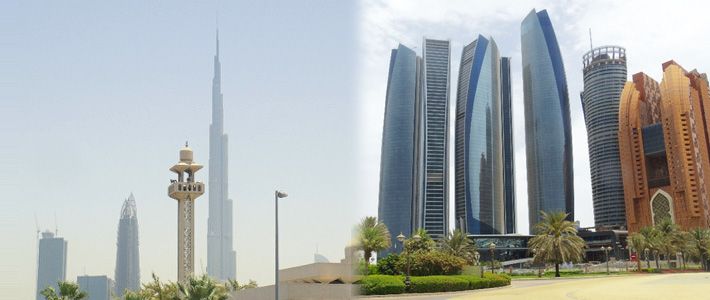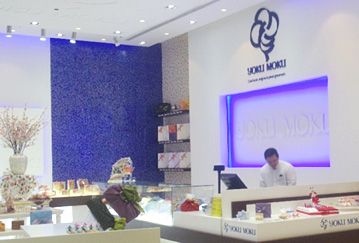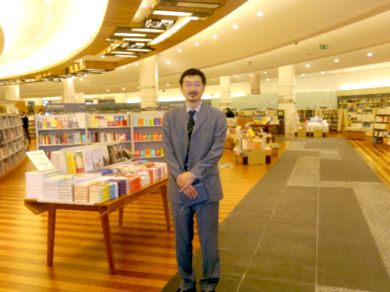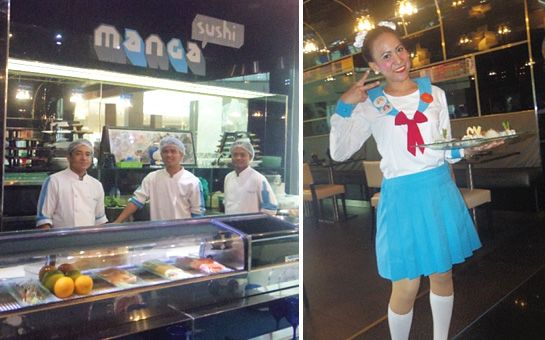
Yoku Moku Seduces the UAE Sweet Tooth
Politics Economy- English
- 日本語
- 简体字
- 繁體字
- Français
- Español
- العربية
- Русский
The United Arab Emirates has become a magnet for Japanese corporate investment in the Middle East and North Africa. Joining the growing community of Japanese trading houses, banks, brokers, and manufacturers in the UAE are several retailers. Two that have built especially prominent presences there are the confectioner Yoku Moku and the bookseller Kinokuniya.
A Retailing Platform in the Middle East
The UAE had attracted direct investment by 431 Japanese companies—323 in Dubai—as of May 2014, according to the Japan External Trade Organization (JETRO). For a lot of those companies, Dubai and Abu Dhabi are regional business hubs for marketing automobiles and other products, building infrastructure, and promoting tourism.
A lot has changed since Dubai’s frightening stumble in November 2009. The emirate stunned the world banking system when property prices collapsed there and the state-backed investment company Dubai World requested a debt moratorium. Dubai World had accumulated $59 billion in debt, and it asked its creditors for a six-month extension of impending repayments due for some of that debt.
Six years on, Dubai’s financial crisis of 2009 is a distant memory amid resurgent economic vitality. The emirate is attracting influxes of people and capital as an island of stability in a turbulent region and as a platform for cultivating market potential throughout the Middle East and North Africa.
Every bit as striking as the influx of capital are the inflows of population. UAE nationals accounted for only about 1 million of the 8,260,000 UAE residents recorded in 2010 government statistics. The vast majority of the residents were migrant workers from India, Pakistan, Arab nations, and elsewhere and corporate expatriates from Western and Asian nations.
Also striking is the tiny space in which the UAE packs its growing economic clout. With a total land area of just 83,600 square kilometers, the UAE is only about as big as Japan’s island of Hokkaidō. The nation’s commercial capital of Dubai, meanwhile, is just slightly larger than Tokyo’s neighboring prefecture of Saitama.
Insatiable Appetites for Yoku Moku
Growth in personal consumption is a prominent facet of the UAE’s economic vibrancy, and tourism accounts for a big chunk of the surging demand for consumer goods, especially luxury goods. Symbolizing the UAE’s prominence as a tourist destination is the towering profile of Dubai’s Burj Khalifa. That 160-story building, completed in 2010, is the world’s tallest at 828 meters.
Accommodating the flood of tourists and business travelers is Dubai International Airport, the world’s largest airport in passenger volume. It passed the former leader, London’s Heathrow Airport, in 2013, when it handled 70,480,000 passengers.
Work continues on Dubai’s second international airport, Al Maktoum, which opened for operation on a single runway in 2010. That airport will be able to handle 98 million passengers a year by 2020, making it the largest transport hub in the Middle East.
In comparison, Japan’s Narita International Airport handled about 70 million passengers in 2014, including domestic travelers. But travelers from abroad accounted for only about 8 million of the total.
Dubai’s tourism and personal consumption will get a big stimulus when the emirate hosts the 2020 World Expo, and numerous retailers from around the world are opening outlets to serve the expected surge in purchasing. Dubai hosts the fourth-largest number of global retailers, after London, Paris, and New York.
 A sales clerk bows politely in the Yoku Moku shop in the Dubai Mall.
A sales clerk bows politely in the Yoku Moku shop in the Dubai Mall.
Retailers report that shoppers in Dubai are sophisticated, price-sensitive judges of quality and that solid branding is a prerequisite for survival in the emirate’s marketplace. A retailer that has succeeded in that demanding market environment is Yoku Moku, a Japanese pioneer in Western-style confectionery.
Yoku Moku operates more than 180 shops in Japan, mainly in department stores, and has built extensive networks of shops in the United States and East and Southeast Asia, as well as the UAE. The company markets a full line of confectionery but is best known for its “cigare” rolled butter cookies, popular as gifts and souvenirs.
Thirteen Shop Openings in Three Years
A joint venture with a local company brought Yoku Moku to the UAE, and the confectioner opened its first shop there in Abu Dhabi in October 2012. Yoku Moku has since opened 12 more UAE shops. And shoppers can’t seem to get enough of the sweets despite prices that are 2.7 times higher than in Japan.
Turnover at Yoku Moku’s biggest-volume outlet in the UAE is comparable to sales at its largest Japanese outlets. Customers rave about the lightly crispy cookies that are “not too sweet.” They love the deluxe packaging and the jumbo assortments. Visitors of all nationalities delight in the attentive service by the salespeople. The service includes bowing deeply, as in Japan, while handing over purchases after escorting customers to the door.
A Huge Bookstore in a Huge Mall
Yoku Moku’s highest-profile location in the UAE is the company’s shop in the world’s largest shopping complex, the Dubai Mall. The mall, which opened in November 2008, is the world leader in total area, with 1,115,000 square meters, and in number of shoppers, with 80 million in 2014. It contains total floor space of some 550,000 square meters and houses more than 1,200 shops and restaurants, along with such attractions as an aquarium, a theme park, an ice rink, a waterfront atrium, and a luxury hotel.
 Kinokuniya’s Kawakami Yukihiro shows off his Dubai store.
Kinokuniya’s Kawakami Yukihiro shows off his Dubai store.
Another Japanese tenant in the Dubai Mall is a big bookstore run by Kinokuniya. In the pre-Amazon era, Kinokuniya was a leading source of English-language books in Japan, and the company has retained an important niche there as a quality vendor of books in Japanese, English, and other languages. It also operates high-profile stores in the United States, Southeast Asian nations, Taiwan, and Australia, as well as the UAE. Kawakami Yukihiro, the manager of Kinokuniya’s Dubai Mall store, relates the tale of his shop’s beginnings.
“A UAE citizen working for us in Singapore kept urging us to come here,” recounts Kawakami. “We spent three years mulling the idea and doing market research before we finally opened this store. The head of Dubai’s Department of Economic Development called on us to create something grander even than our main store in Singapore, and that’s what we did.”
Kinokuniya more than fulfilled the highest expectations at the Department of Economic Development. The Dubai Mall store, with floor space of 6,000 square meters, is 50% larger than the company’s main Singapore emporium. English-language titles account for most of Kinokuniya’s offerings in Dubai, though the mall store also handles an extensive array of books in Arabic, Japanese, and other languages. Altogether, the store stocks more than 500,000 books and magazines, along with a diversity of stationery, toys, action figures, and other merchandise.
Just Three Japanese Expatriates
About half of the customers at Kinokuniya’s Dubai Mall store are from other Middle Eastern nations, according to Kawakami. He reports that purchases average about 3.5 books and that business subjects are the best-selling categories.
“Japanese service,” Kawakami declares immediately when pressed for Kinokuniya’s success formula in Dubai. “Another important factor is our comprehensive selection, which includes a lot of small-volume books that are unavailable elsewhere.”
Still other elements of Kinokuniya’s appeal in Dubai are the store’s chic interior and the tasteful selection criteria evident in the rows of books on display. Kawakami and his staff are careful, incidentally, to avoid stocking books or magazines likely to offend Islamic sensibilities in regard to sexual or religious content.
The Dubai Mall Kinokuniya reflects the bookseller’s longstanding commitment to local management at its overseas stores. That commitment dates from the opening of Kinokuniya’s first store outside Japan in San Francisco in 1969. Kawakami is one of only three Japanese expatriates at the Dubai Mall store, which employs about 100 people. The employees work in three shifts to serve customers through the store’s long business hours: 10 a.m. to 10 p.m. Sunday to Wednesday and 10 a.m. to midnight Thursday to Saturday.
Local Management Under a Japanese Billboard
Yoku Moku and Kinokuniya are but two of several Japanese retailers that have established lucrative footholds in the UAE. Two others that have done well in the nation and are highly visible presences in the Dubai Mall are the discount retailer Daiso Japan and the household and consumer goods retailer Muji. Also lending a Japanese flavor to the mall is a kaiten (conveyor-belt) sushi restaurant of the London-based Yo! Sushi chain.
Daiso Japan has been especially active in Middle Eastern investment. It has opened more than 40 stores in Arab states of the Persian Gulf since opening its first store in the region in Dubai in 2004.
Although the UAE has been a receptive market for Japanese companies, obstacles remain. Those obstacles perhaps account partly for the surprising absence of some globally ubiquitous Japanese retailers, such as Uniqlo.
“Foreign investors cannot own more than 49% of businesses based outside [the nation’s numerous free-trade zones],” explains JETRO Dubai Executive Director Nishiura Masaru. “And though Dubai levies no personal or corporate income tax and does not collect social security contributions from expatriates, it does gather tax revenue through a tourism tax.”
The UAE’s capital controls mean that businesses operating outside the free-trade zones under foreign names are not what they appear. Behind each is a local partner that holds a majority stake. And some seemingly Japanese businesses are entirely local operations.
 Itamae chefs and a maid-costumed waitress dispense manga sushi.
Itamae chefs and a maid-costumed waitress dispense manga sushi.
Manga Sushi, a restaurant that delights Dubai diners with its Japanese comics theme, is the brainchild of the locally based Sultan Group Hospitality. The itamae sushi chefs and the waitresses are an international cast of Filipinos, Nepalese, and Singaporeans, and most of the diners are Arabs. Uncooked fish has yet to gain a broad following in the UAE, so the menu centers on broiled and boiled seafood and vegetable dishes.
Another locally owned company that operates under a Japanese name is the Yamaha Café. That eatery opened this March in a structure built from shipping containers in a district known for such architecture. It draws diners with displays of Yamaha motorcycles and free games.
(Originally written in Japanese on May 25, 2015. Banner photo: Postmodern architecture hoists Dubai skyward.)
United Arab Emirates UAE,Abu Dhabi Middle East and North Africa Yoku Moku Kinokuniya